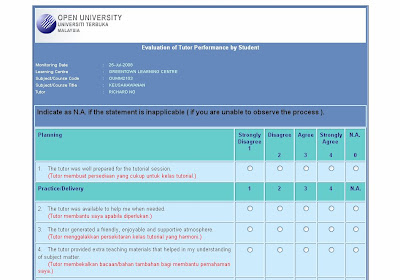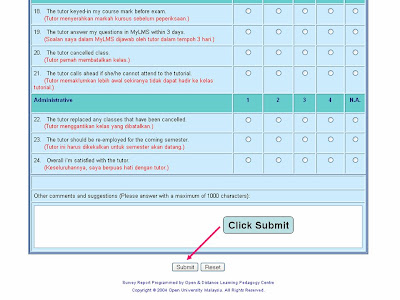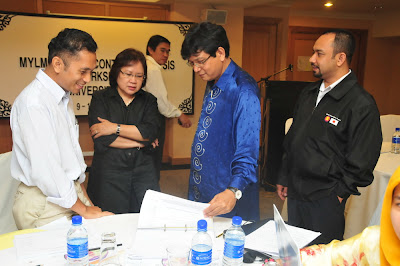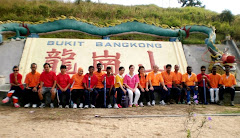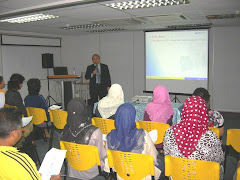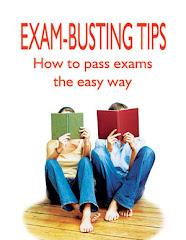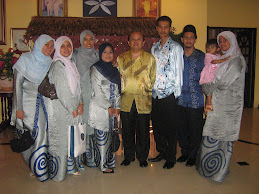By SUBASHINI SELVARATNAM
 In Malaysia, the eBook phenomenon is more common among learning institutions.
In Malaysia, the eBook phenomenon is more common among learning institutions.The eBook phenomenon may have taken Japan by storm but its take-off rate in Malaysia is slow, writes SUBASHINI SELVARATNAM.
NATSUMI jumps onto the train in the nick of time, quickly flips open her mobile phone and begins to read a romance novel, which she had downloaded from the Internet using her mobile phone.
Natsumi is not alone. In 2006, Japanese eBook lovers like her have collectively contributed to increased sales — from US$14 million (RM49 million) to US$58 million — of mobile phone eBooks in the country.
Natsumi likes the eBook, which is an electronic book, because she does not have to carry the printed version wherever she goes.
 eBooks are cheaper than printed books as there are no paper, printing and physical distribution costs involved, said Kee.
eBooks are cheaper than printed books as there are no paper, printing and physical distribution costs involved, said Kee.Just like a printed book, an eBook has numbered pages, table of contents and even pictures.
Natsumi can even turn a page at the click of a button. In addition, she can change the font size and read her novel in the dark as her mobile phone comes with a built-in backlight.
As Natsumi continues to read her novel, she uses the search and dictionary features often to look up a word. For her, reading novels and manga (comic books) for free is great, although she has to pay for selected novels. The fact that eBooks can be downloaded (via Internet) and read instantly on the mobile phone is a plus point as Natsumi is always on the move.
When she is at home, Natsumi also reads eBooks on her personal computer.
However, Natsumi’s best friend Sakura, who tried to read an eBook, gave up after a few attempts. She finds reading an eBook — which was invented by Michael Hart in 1971— on the mobile phone or PC hard on her eyes.
Sakura enjoys the smell, look and feel of a printed book. She despises the idea of lugging an eBook device — a portable gadget powered by battery and a display for viewing text and pictures — to read an eBook (http://en.wikipedia.org/wiki/E-book_device).
Moreover, Sakura is clueless when it comes to eBook formats, as some of the eBooks may not be compatible with the eBook reader, a software for reading eBooks (http://en.wikipedia.org/wiki/Epub#IDPF).
Sakura feels it is like a videotape player when your favourite movie is only available on DVD.
As the above illustration shows, Natsumi and Sakura are two different personalities caught in the eBook phenomenon in Japan.
 Stafford says the Monash University library tries to get eBook versions of printed books that are in high demand.
Stafford says the Monash University library tries to get eBook versions of printed books that are in high demand.
In Malaysia, the eBook trend is growing, albeit slowly. It is more common among learning institutions and one of them is Monash University, which boasts a full-fledged online library with 266,611 eBook titles.
Australian-based Monash University collection management librarian Robert Stafford says the library started buying eBooks in 2002, and is currently spending more than US$20,000 a month on them. In total, the library has probably spent more than US$1 million.
All staff and students at the Australian, Malaysian and South African Monash campuses have access to the eBook library via the Monash University website. This means they can read eBooks anywhere in the world.
 Peterson reads eBooks for both leisure and academic purposes.
Peterson reads eBooks for both leisure and academic purposes.Even so, the eBook library is not open to the public as the publishers and vendors will not allow it. On the Australian campus there is access for walk-in members of the public, if they visit the library, which buys or subscribes to eBooks from a wide range of publishers.
“We try to get eBook versions of printed books that are in high demand but publishers are generally reluctant to allow this, particularly with textbooks,” says Stafford.
“But this is changing and we recently bought some medical textbooks for which we paid a lot of money. Most of the eBooks here are pre-1800,” he adds.
But Multimedia University Siti Hasmah Digital Library has terminated its eBook subscription — eBrary — due to poor use.
However, soft versions of students’ master’s and PhD theses are available through MyTO (Malaysian Theses Online) accessible to both students and lecturers.
In addition, there are about 31 online books available from Wiley InterScience for the subject of life sciences.
 eBooks provide more up-to-date information compared to traditional books, says Juhana.
eBooks provide more up-to-date information compared to traditional books, says Juhana.It is learnt that the National Library of Malaysia has temporarily discontinued its eBook library — also called eBrary — that provides access to eBooks on a variety of subjects “due to unforeseen circumstances”. The service is expected to resume in September.
Director general Raslin Abu Bakar says the library has been subscribing to eBrary since 2005.
The service was made available to 25 libraries in Malaysia through the Mylib portal.
The Ebrary is part of MyLib, a project under the proposed National Digital Library initiative. MyLib was launched in 2000 and is spearheaded by Multimedia Development Corporation and the National Library using infrastructure provided by Telekom Malaysia. MyLib serves as a one-stop centre and is a gateway to knowledge and information on the Internet.
As of this month, Mylib provides access to seven local databases and four foreign databases. The library also subscribes to NSTP emedia and LAWNET for National Library users.
As the information gateway, Mylib has opened its doors to people from all walks of life who want to gain access to digital information.
“Currently, we are working on upgrading the Mylib portal to enhance its services. The project is expected to be launched by end of this year,” says Raslin.
MPH Bookstores Sdn Bhd deputy chief operating officer Donald Kee says the take-off rate of eBooks among the general consumers in Malaysia is discouraging.
He says eBook devices are not easily found locally and are expensive. The two most popular eBook devices are from Sony and Amazon.com.
Currently, there are no resellers — companies that buy products in bulk from a manufacturer and sell them to consumers in Malaysia — for eBook devices because of compatibility and support issues.
“Of course you can read eBooks from your desktop and personal digital assistant via eBook reader but it is a totally different experience,” says Kee.
Kee says eBook devices (hardware) and eBook readers (software) are not perfect and need fine-tuning before eBooks can gain acceptance locally.
On top of that, the reading market in Malaysia is small compared to those in the United Kingdom and United States, which gives no motivation for eBook device manufacturers to market their products here.
Only a small population of tech savvy Malaysians are into such gadgets. Despite the poor acceptance of eBooks in Malaysia, MPH Bookstores is planning to sell books in eBook format.
With its electronic-commerce business model in place, it will not be difficult for the bookshop to venture into eBooks.
Apparently, academic eBooks are popular among users. This include text and reference books for schools and universities as well as leisure-based eBooks such as fiction, self-help and general business.
On whether eBooks are eligible for tax rebate (RM1,000) offered by the Malaysian government, Kee believes if the receipt has a good description of an eBook, the Inland Revenue Board will accept it.
“eBooks are cheaper than printed books as there are no paper, printing and physical distribution costs involved. Like digital music downloads, eBooks will only work if the price is cheaper than printed books,” says Kee.
The eBook is an interesting concept but it may take a while before Malaysians latch on to it.
No more cockroaches and silverfish
MOST people read eBooks for academic purposes while others read for leisure.
Universiti Kebangsaan Malaysia Faculty of Information Science and Technology Associate Professor Dr Juhana Salim reads eBooks on ICT and information science.
“eBooks provide more up-to-date information compared to the traditional publication process, which normally takes too long, and by the time a book gets published, the content is at least two years outdated,” says Juhana.
eBooks are very useful especially in her field — Internet facilities and information skills — as new information is being generated every day. This helps her to keep abreast of all the latest developments in technology.
Mesiniaga Berhad team leader and network consultant Mohandas Bhaskaran also reads eBooks for academic purposes.
He reads articles and documents that are mostly related to his field, which is technical in nature.
“I like reading eBooks because I do not need to carry printed books with me wherever I go. With an eBook, I can read it from my notebook, personal digital assistant and I can store it in my PC hard disk,” he said.
“Moreover, I do not have to worry about cockroaches and silverfish infesting my eBooks!”
Malaysian Business section editor Cynthia Ann Peterson reads eBooks for both leisure and academic purposes.
There are many online libraries which offer the classics in literature as eBooks.
She also looks up the background of articles she plans to write in technical books.
“The eBooks that I like are mostly classics such as 1984 and Keep the Aspidistra Flying. I usually refer to the references in Wikipedia for technical stuff,” she says.
“eBooks are free. They are easier to browse as you can read different samples, find out more information through the Internet and you generally have access to them for as long as you like.”
The downside of eBooks is that not everything is available for free. She is also not keen on staring at the computer screen for hours.
Peterson usually reads eBooks on a PC but she has a friend who downloads them to his PDA.

 Prof. Mansor, Senior Vice President, graced the occassion
Prof. Mansor, Senior Vice President, graced the occassion Assoc. Prof. Dr. Selvaraj chaired the 3-day retreat
Assoc. Prof. Dr. Selvaraj chaired the 3-day retreat Prof. Dr. Zoraini took the stand to deliver her presentation on Understanding Open and Distance Learning
Prof. Dr. Zoraini took the stand to deliver her presentation on Understanding Open and Distance Learning My group members in Group 3 comprised of (from left) Aiman (LMS), Mualim (Meteor Doc), Puan Alia (TMU), Faezah (Finance), Chiam (FBM), Syahrul (Finance)
My group members in Group 3 comprised of (from left) Aiman (LMS), Mualim (Meteor Doc), Puan Alia (TMU), Faezah (Finance), Chiam (FBM), Syahrul (Finance)  Group photo with Group Management Committee members
Group photo with Group Management Committee members Puan Faizah conducting her training session.
Puan Faizah conducting her training session. En. Repin, Meteor/OUM COO, took the opportunity to meet participants and brief them about OUM
En. Repin, Meteor/OUM COO, took the opportunity to meet participants and brief them about OUM Preparing for our next outdoor activity conducted by Mr. Puniamurthy (centre). On the left is Dr. Selvaraj.
Preparing for our next outdoor activity conducted by Mr. Puniamurthy (centre). On the left is Dr. Selvaraj. Mr. Murthy oontinued with the findings of the group outdoor activity.
Mr. Murthy oontinued with the findings of the group outdoor activity. Stephen started the session with the quote from Zig Ziggler
Stephen started the session with the quote from Zig Ziggler Responding to emails in between training
Responding to emails in between training

